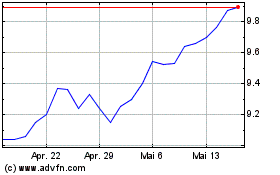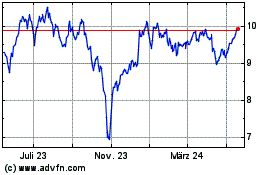These are unusual times for the U.S Real Estate Investment Trust
(REIT) industry. After a remarkable run in the first four months of
the year, the REIT industry has nosedived since May, and the
volatility continues.
Prior to the recent uptrend in interest rates, the demand for these
high-dividend-paying stocks remained sky high. In 2012, the
industry delivered a solid performance with the stocks beating the
broader equity market for the 4th straight year.
However, with the increasing yields on the U.S. Treasury 10-year
note (2.55% as of Jun 24, 2013, compared with 1.68% at the end of
April), investors are turning their focus away from REITs
(primarily the mortgage REITs, commonly known as mREITs). Moreover,
rising interest rate environment is a growing concern for the REIT
stocks as investors are concerned about the negative impact on the
book values and financing costs.
In May, on a total return basis, the FTSE NAREIT All REITs Index
lost 6.56% and the FTSE NAREIT All Equity REITs Index lost 5.90%
compared with the S&P 500 that gained 2.34%.
The June data looks disappointing as of now, since the FTSE NAREIT
All REITs Index lost 6.62% and the FTSE NAREIT All Equity REITs
Index lost 6.54% (as of Jun 24, 2013) compared with 4.10% loss for
the S&P 500.
Dividends Still Remain an Attraction
With the U.S. law requiring REITs to distribute 90% of their annual
taxable income in the form of dividends to shareholders,
yield-seeking investors continue to prefer these stocks. This has
aided the industry to stand out and gain a strong foothold over the
past 15-20 years.
As of May 31, the dividend yield of the FTSE NAREIT All REITs Index
was 4.19%, and the dividend yield of the FTSE NAREIT All Equity
REITs Index was 3.35%. Moreover, the dividend yield of the
FTSE NAREIT Mortgage REITs Index was 12.55% as of that date
compared with 2.14% for the S&P 500.
Capital Access
Accessibility to capital is a prime factor in the REIT Industry.
After raising $51.3 billion capital in 2011 and a total of $73.3
billion in 2012, REITs raised $40.5 billion in the first five
months of 2013.
During the latest downturn, REITs were able to acquire premium
properties from highly leveraged investors at heavy discounts.
Furthermore, REITs typically have a large unencumbered pool of
assets, which could provide an additional avenue to raise cash
during crisis. These assets, in turn, have provided the requisite
wherewithal to the REIT industry to grow through strategic
acquisitions over time.
Zacks Industry Rank
Within the Zacks Industry classification, REITs are broadly grouped
into the Finance sector (one of 16 Zacks sectors) and further
sub-divided into four industries at the expanded level: REIT Equity
Trust - RETAIL, REIT Equity Trust - Residential, REIT Equity Trust
- Other and REIT Mortgage Trust.
We rank all the 260 plus industries in the 16 Zacks sectors based
on the earnings outlook and fundamental strength of the constituent
companies in each industry. To learn more visit: About Zacks
Industry Rank
As a point of reference, the outlook for industries with Zacks
Industry Rank #88 and lower is 'Positive,' between #89 and #176 is
'Neutral' and #177 and higher is 'Negative.'
The Zacks Industry Rank for REIT Equity Trust - Retail is #82, REIT
Equity Trust - Other is #84, REIT Mortgage Trust is #167, while the
REIT Equity Trust - Residential is #180. Analyzing the Zacks
Industry Rank for different REIT segments, it is obvious that while
the outlook for mortgage trusts and residential equity trusts is
leaning towards the negative side, retail equity trusts and other
equity trusts remain at the low end of the positive side.
Earnings Trends
The broader Finance sector, of which REITs are a part, remains in
excellent earnings shape. The first quarter 2013 results for the
sector were impressive in terms of both beat ratios (percentage of
companies coming out with positive surprises) and growth.
The earnings "beat ratio" was 73.4% while the revenue "beat
ratio" was 51.9%. Total earnings for this sector were up 7.7%,
slightly moderating from the 10.0% growth in the fourth quarter of
2012. Total revenues moved north 5.5% in the quarter verses 23.1%
growth in the prior quarter.
Looking at the consensus earnings expectations for the rest of the
year, we remain encouraged since earnings are expected to grow
19.1% in the second quarter, 7.6% in the third quarter and 27.6% in
the fourth quarter, thereby registering full-year 2013 growth of
14.0%.
OPPORTUNITIES
Retail REITs: Being a leader, the U.S. retail industry
provides adequate growth prospects for these REITs. Despite the
rise in online shopping through the Internet, mobile phones and
tablets, it is the physical interaction that the millennial
generation stills prefers while shopping. Hence, amid the
technological advancements, in order to increase their market
dominance, the retail industry keeps on reinventing, redesigning
and revamping their physical stores.
With retail properties in premium locations, companies like
Kimco Realty Corporation (KIM), The
Macerich Company (MAC) and Acadia Realty
Trust
(AKR) remain our primary choiceS.
Healthcare REIT: Relatively immune to the macroeconomic
problems, these REITs are expected to benefit from rising national
health expenditures that are projected to grow 3.8% in 2013 and
7.4% in 2014, according to Centers for Medicare and Medicaid
Services. Also, the federal agency projects average compounded
annual growth rate of health expenditures of 6.2% over 2015 through
2021.
Moreover, though the forthcoming wave of retiring baby boomers is
often cited as a threat to the U.S. economy, this is a boon for the
healthcare sector as senior citizens spend 200% more than the
average population.
Hence, we believe that Healthcare REITs like HCP
Inc. (HCP), Health Care REIT, Inc. (HCN)
and Healthcare Realty Trust Inc. (HR) can
capitalize on this trend.
Industrial/Storage REITs: With a larger customer base,
rise in e-Commerce application and supply chain consolidation, the
demand for logistics infrastructure and efficient distribution
networks have risen.
This has lead to a rising need for industrial/storage facilities
and the stocks to consider include Extra Space Storage
Inc. (EXR), DCT Industrial Trust Inc.
(DCT) and CubeSmart (CUBE).
Lodging/Resorts REITs: With the improving U.S. business and strong
international travel and tourism volumes, the lodging sector is
expected to continue with its recovery. Particularly, the North
America market is anticipated to significantly benefit with limited
supply and rising demands.
Stocks that worth a look include are Sunstone Hotel
Investors Inc. (SHO), Diamondrock Hospitality
Co. (DRH) and Host Hotels & Resorts
Inc. (HST).
Apartment REITs: With the lack of stability in the job
market along with mounting student debt, the home ownership in the
under-35 age cohort continues to decline. Since renting has emerged
as the only viable option for customers who cannot avail mortgage
loans or are unwilling to buy a house at present, we expect the
apartment sector to remain comparatively steady in the coming
quarters.
We favor stocks like Select Income REIT (SIR),
Apartment Investment & Management Co. (AIV)
and Equity Residential (TM).
WEAKNESSES
For the sector as a whole, rising interest rates are a looming
concern. High capital costs erode their profit level and hence
trigger a fall in the dividend yield that the investors primarily
look for while investing in REIT stocks. Considering individual
segments, we believe that the current macroeconomic environment
remains a menace for the following sectors.
Mortgage REITs: In the past couple of years, with low
short-term rates and quantitative easing policies (QE), mREITs have
benefited from lower borrowing costs, leading to higher yields
(they invest in mortgage backed securities and use short-term debt
for financing their purchases making money from the spread).
Amid the increasing yields on the U.S. Treasury 10-year note and
apprehensions that the Fed will soon pull out its QE program,
mREITs stocks are continuing to lose their shine. Subsequently, the
FTSE NAREIT Mortgage REITs total returns dropped 17.25% from the
beginning of the second quarter till Jun 20, 2013.
In the recent past, mREITs like American Capital Agency
Corp. (AGNC) and American Capital Mortgage
Investment Corp. (MTGE) slashed their dividends. The other
stocks that we would like to avoid are Hatteras Financial
Corp. (HTS) and Newcastle Investment
Corp. (NCT).
Another division which may underperform is the Office REIT. With
the U.S. economy still registering sluggish growth, the demand for
office properties, particularly in the suburban market still lacks
luster. As such, companies like Mack-Cali Realty
Corp. (CLI) have started to trim their office properties
and diversify into the relatively stable multifamily apartment
sector.
Conclusion
The macroeconomic issues and the political situation have been
affecting the market, but we believe that with the economic
recovery gaining momentum, rents and occupancies would improve
further. Moving forward, limited supply of new construction coupled
with the growing demand for premium properties bode well for the
REITs, in particular for those that have assets in high
barriers-to-entry markets.
AMER CAP AGENCY (AGNC): Free Stock Analysis Report
APARTMENT INVT (AIV): Free Stock Analysis Report
ACADIA RLTY TR (AKR): Free Stock Analysis Report
MACK CALI CORP (CLI): Free Stock Analysis Report
CUBESMART (CUBE): Free Stock Analysis Report
DCT INDUSTRIAL (DCT): Free Stock Analysis Report
DIAMONDROCK HOS (DRH): Free Stock Analysis Report
EQUITY RESIDENT (EQR): Free Stock Analysis Report
EXTRA SPACE STG (EXR): Free Stock Analysis Report
HEALTH CR REIT (HCN): Free Stock Analysis Report
HCP INC (HCP): Free Stock Analysis Report
HEALTHCARE RLTY (HR): Free Stock Analysis Report
HOST HOTEL&RSRT (HST): Free Stock Analysis Report
HATTERAS FIN CP (HTS): Free Stock Analysis Report
KIMCO REALTY CO (KIM): Free Stock Analysis Report
MACERICH CO (MAC): Free Stock Analysis Report
AMER CAP MTGE (MTGE): Free Stock Analysis Report
NEWCASTLE INV (NCT): Free Stock Analysis Report
SUNSTONE HOTEL (SHO): Free Stock Analysis Report
SELECT INCOME (SIR): Free Stock Analysis Report
To read this article on Zacks.com click here.
AGNC Investment (NASDAQ:AGNC)
Historical Stock Chart
Von Jun 2024 bis Jul 2024

AGNC Investment (NASDAQ:AGNC)
Historical Stock Chart
Von Jul 2023 bis Jul 2024
